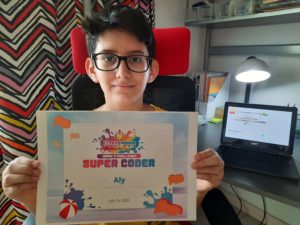
The ability to code is a valuable skill that children can apply to their schoolwork and potentially their careers. From improving academic performance to providing a creative outlet for your child, coding doesn’t have demographic limitations. Anyone can develop the skills to become a proficient coder, starting with children in the K-12 setting. In this blog, we will discover why children really need to code.
What is Coding?
Coding is the process of creating instructions that computers can understand and follow. These instructions are written in a special language called code. Essentially, coding is like writing a recipe for a computer to follow.
Children need to code because it helps them develop problem-solving skills, creativity, and critical thinking. Through coding, they can learn to create their own games, animations, and websites. Coding is a valuable skill that can help children succeed in the future, as it is becoming increasingly important in many fields, including science, engineering, and technology. By learning to code, children can become creators of technology, not just consumers.
Why Should My Child Need to Learn to Code?
In the 21st century, many of our day-to-day interactions require coding. From your smartphone and calendar filled with video calls to ordering everything from food to furniture online, coding has a huge impact on everyday life. The devices and programs we use are expertly crafted by skilled software developers, whose median annual wage in May 2021 was $120,730, making it a lucrative career. With 67% of new STEM jobs in computing, the ability to code is quickly becoming a great skill to have in your toolbelt.

Coding Builds 21st Century Skills:
- Creativity
- Confidence
- Communication
- Collaboration
- Critical Thinking
- Problem-Solving
- Time Management
- Goal-Setting
- Plus many more!
While coding gives kids an advantage later in life, it has numerous benefits that will pay off in the short term too. The benefits of coding for students are that it helps develop problem-solving, critical thinking, and digital literacy skills that can be applied in any academic discipline, whether they love math, science, English, or history.
Computer science is fast becoming a favorite subject for students, with more than 50% saying that they like it more than math, science, and history, according to Hour of Code. With the number of children learning to code rising, many parents may be asking themselves: “What is coding for kids?”. Not convinced, check out another article from Tynker:
Top 10 Reasons Kids Should Learn to Code
Learning to code teaches children the skills needed to understand visual blocks as well as real-world computer programming languages like JavaScript, Python, HTML, and CSS. Coding may appear on the surface to be an intimidating subject. But the emergence of visual coding platforms like Tynker make learning to code not just easy but fun.

What Skills Does Coding Develop?
Children really need to learn code in today’s digital age. Computer programming isn’t just about creating software and websites, it is also a valuable tool for developing a wide range of skills. Here are three ways computer programming impacts your life and helps you develop essential skills:
- Logical thinking: Coding helps children develop logical thinking skills by breaking down complex problems into smaller, more manageable parts. This skill is essential in everyday life as it helps you make structured decisions and solve problems in a more efficient way.
- Problem-solving: Coding helps children develop problem-solving skills by teaching them how to analyze, debug and troubleshoot code. These skills can be applied to everyday life situations and are invaluable in any career.
- Creativity: Coding also helps children develop their creativity by allowing them to express themselves through code. It encourages them to think outside the box and come up with unique solutions to problems.
Coding is a valuable skill that can help children develop essential skills that are useful in everyday life.
How Can Kids Learn to Code?
Much like learning a foreign language, teaching kids to code at an early age can create a strong foundation upon which advanced skills can be built. Fortunately, there are numerous viable options for parents to get their kids into computer programming.
Coding courses can be taught online or in-person, or kids can even effectively teach themselves with self-paced platforms, like Tynker. Tynker offers gamified coding activities to make learning how to code fun and exciting.
Here are some different ways you can help your child learn how to code:
Block coding programs utilize text-based, drag-and-drop “blocks” of code to create animated programs or stories. Block coding is a visual form of code that can help kids learn coding basics from an early age. Tynker and Scratch (built by MIT) offer block coding programs, familiarizing kids with key coding concepts before moving on to more advanced courses.
Code.org is the nonprofit organization behind Hour of Code, an event designed as an introduction to code for kids interested in coding. The organization has inspired tech companies to create free coding tutorials while compiling available resources for parents, including local schools that teach coding. And though schools can be a great resource for children looking to code, only about half of them offer computer science classes, many of which are just for older students.
Paid Coding Programs: Having empowered the creativity of over 60 million young coders worldwide, Tynker offers 70+ award-winning coding courses, from block coding to real-world text coding languages like JavaScript and Python.
Tynker has distinct pathways—tailored to the individual learner—with 300 lessons featuring six mastery levels, teaching children of all ages and skill levels how to be successful computer programmers through self-paced courses, interactive tutorials, creativity tools, and three on-the-go mobile apps.
With Tynker, children can supplement their learning with live online classes and interest-based electives such as Modding with Minecraft, Robotics & AR, and Game Design. And for more advanced students, Tynker offers a variety of electives, including Image Processing and Art, AP prep with Java, and Data Science.

Get your child coding for FREE with Tynker!
With so many coding classes for kids, there’s bound to be a good fit for your child. Encouraging them to learn to code can lead to a lifelong passion for coding and help them find the career of their dreams. Even if your child doesn’t use coding skills in their professional life, the digital literacy, problem-solving, and critical thinking skills they will have learned will be invaluable in setting them up for a lifetime of learning and success.
How Computer Programming Impacts Your Life
Computer programming has become an integral part of our daily lives. From smartphones to social media, almost every aspect of our lives is influenced by programming. There are numerous articles about coding that explain how it affects our lives. Learning to code is a valuable skill that can help your kids with computer coding in their future careers. It is essential to teach your kids to code as it promotes problem-solving skills, logical thinking, and creativity. Computer programming has a significant impact on our lives and learning to code can provide numerous benefits.
Check out Tynker’s Curriculum and learn more about inspiring the next generation to change the world through code.




